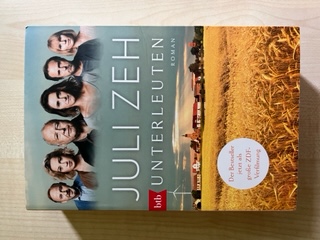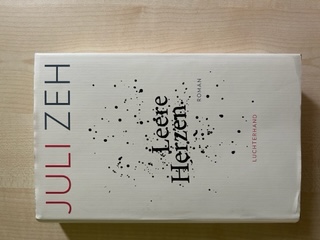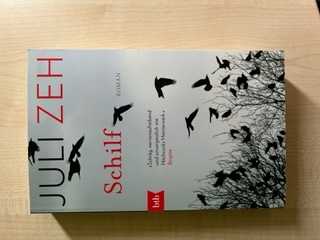A Year in (contemporary Fiction) Books
Posted: 17th November 2021Preface
I read quite a bit of fiction this year, and big parts of it consisted of modern, contemporary liteature. While I certainly did not enjoy everything equally, there nonetheless remained quite a lot of works which I genuinely took pleasure in reading. Here, I want to share some of those, which I found especially appealing.
"The Every", Dave Eggers

I really enjoyed this one. In fact, I enjoyed it so much, that I wrote a blog post about the novel and some of its ideas that stuck with me. Definitely a must-read if you are interested in technology's role in society, and how technological progress can and does affect the way we live. And despite this serious theme, it's written in a very entertaining and humorous way.
"1984", George Orwell

The classic. One of the books I somehow managed to have never read before. So when I saw it in a station bookshop some months ago, I instantly bought it. And although this sentence has by now become a cliche in itself, I'll still say it: "1984 is still as least as relevant today as it was when it was written."
One of my key takeaways from the book was the possibility of (ab)using a state of (real or imagined) crisis to justify implementing measures people would normally object to. I think the parallels to today's society are pretty obvious, in which surveillance becomes more and more widespread and justified by mentioning e.g. the danger of potential terrorist threats.
Another key point to me was the idea of requiring poverty for keeping people from the so-called "lower classes" obedient, and thus more accepting of the status quo in general, and power hierarchies in society in particular. I think there generally is a lot of truth to this, as people with financial obligations naturally are primarily concerned with those obligations and how to fulfill them.
However, in my opinion, this idea does not only apply to the "lower classes," but indeed holds true for bigger parts of society. Additionally, real life, in contrast to the world the novel plays in, does not even require strict poverty, or any governmental action to artificially induce it (by e.g. limitting resource availability as in the book). Modern (Western) society arguably is rather consumerist in nature, and thus people are likely to desire and pay for expensive goods such as houses, cars, consumer electronics etc. anyway, in many cases with borrowed money. In this way, obligations arise naturally, which in turn make people more likely to stay in line and in the rat race.
The last major point I kept in mind was exactly how powerful redefining the meaning of words can be when it comes to dominating public discourse and moving it into a desired direction. Incidentally, that's also a point that has been touched by "The Every" (see above).
"NSA -- Nationales Sicherheits-Amt", Andreas Eschbach

A work of speculative fiction taking place in the German town of Weimar in the year of 1942. In the world of the novel, the computer (as well as the internet, e-mail, cell phones and social media) has already been invented -- and has become a powerful tool of the Nazi regime to surveil society and to track down its opponents. Despite the dark atmosphere of the story, the novel is written in an enjoyable style that's entertaining to read.
I especially liked that the novel contains a multitude of different scenes which clearly amd concretely illustrate just how easy it is to abuse even "unimportant" personal data. I feel that a novel can make this point in a way more striking way than any technical report or talk ever could. It definitely makes one think about the increasing degree of surveillance and the data collection frenzy we are subjected to in modern-day society.
"Unterleuten", Juli Zeh

This social novel was actually recommended to me by a professor of mine some months ago. The story takes place in the fictional small town of "Unterleuten" in Brandenburg, Germany. The plot is centered around the conflicts arising between the town's inhabitants when an investor from outside tries to establish a wind farm. Admittedly, the topic of the plot in itself does not sound very exciting.
However, what definitely is exciting and what makes this book interesting and worth reading is its narrative style. The story is told from a number of different, alternating points of view. In this way, we perceive all of the characters as fellow humans, instead of one-dimensional minor characters a protagonist interacts with. Throughout the complete story, all of these characters keep acting in a way that makes sense to them and that is completely logical and justified. Thus, one feels empathy with them and even "feels a bit more human" oneself in the process. This makes the book genuinely enjoyable to read.
Another good point being made is just how extremely different the very same situation can be perceived and understood by different people, but how all of these perceptions always are justified and make sense in the light of the person's prior experiences, prior knowledge (or lack thereof), personal sense of moral, and, importantly, implicit assumptions. In this way, exactly what is said in the book's blurb ultimately happens: although everybody has only the best intentions, and nobody wants to do any harm, terrible things happen.
"Leere Herzen", Juli Zeh

After enjoying "Unterleuten" so much, I looked up the other works of its author, finding -- among others -- "Leere Herzen." It has some rather hefty plot twists, so I will not spoiler anything here and will only talk about the book in very broad terms. It takes place in Germany in the (very near) future, and touches upon democracy and how easy it can be lost quietly. It is also centered around the members of modern society, their lack of strong social and ethical convictions, and their moral arbitrariness -- people with "empty hearts", which is the literal translation of the book's title. It ends, however, on an optimistic note, showing a potential avenue of escape from this "emptyheartedness" and giving hope for the future of the empty-hearted individual and the society it lives in.
"Schilf", Juli Zeh

And yet another one by Juli Zeh, equally enjoyable as the previous two ones above. Similar to "Leere Herzen", there are some strong plot twists in the story, so I will again only mention some very general thoughts on it. On the surface, the book is a typical crime story which takes you on a pretty wild ride with multiple sub-plots consisting of child abduction, corruption, and murder; however, the story also raises some interesting ethical questions, touches upon theoretical physics, and nicely explores the personal relationships between its characters.
Since its release, the book has received mixed appraisal, with more negative criticism primarily pointing out a certain degree of linguistic and thematica overambitiousness. While I do think that this is a fair point, I however still enjoyed reading the book and can definitely recommend it.
Conclusions
This year, I have actively decided to read more contemporary fiction, and I definitely do not regret this decision. In the past, I used to primarily read non-fiction and academic texts (which I naturally still read an awful lot ot), as well as "the classics", while to a certain extent often disregarding modern literature. Thus, getting a more contemporary perspective on some of the current issues was a nice change and something I will definitely continue to do.